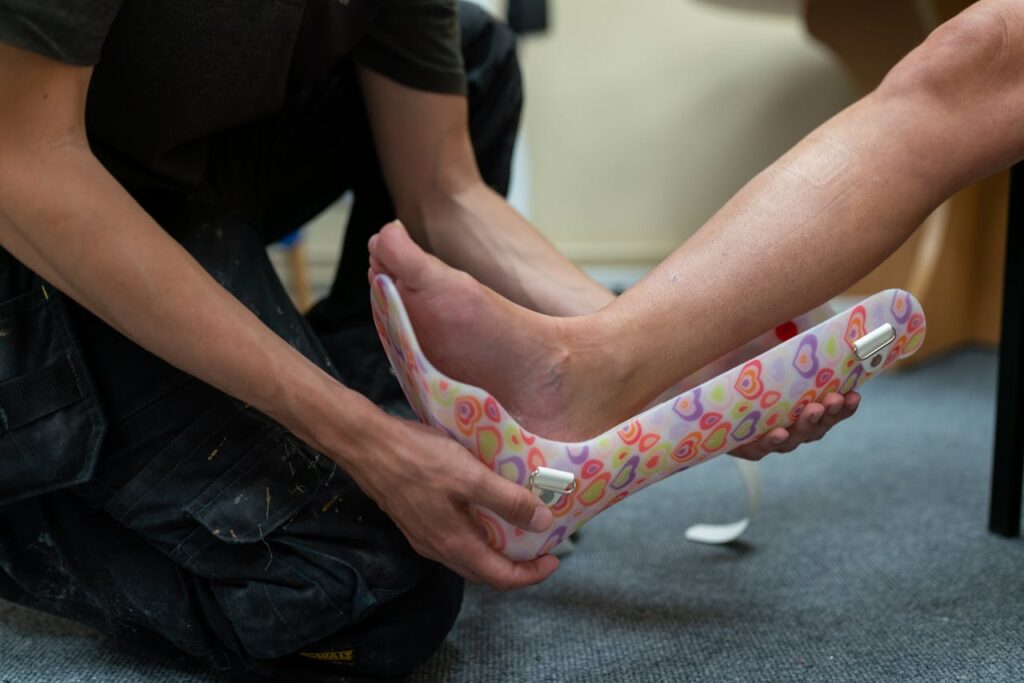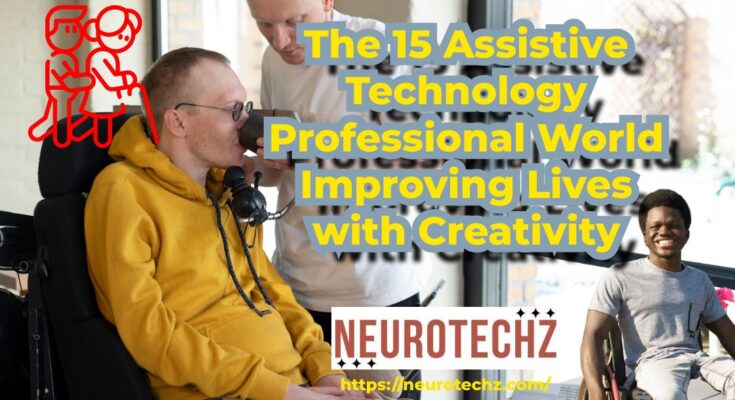Assistive Technology Professional (ATP) offers groundbreaking solutions for disabled people
As the world of technology changes quickly, the developing discipline of assistive technology (ATP) provides revolutionary ways to enhance the lives of those with impairments. Since ATPs can bridge the gap between accessibility and technology, they are crucial to effectively implementing this technology.
Understanding Assistive Technology Professionals
Advanced-skilled Assistive Technology Professionals (ATPs) enable disabled persons to use assistive technology daily. They have various technical solutions to reduce obstacles to independent life, work, education, and communication. Hospitals, schools, rehab centres, and private practices are just a few places where ATPs are used.
Qualifications and Training
A certified assistive technology professional must combine education, training, and real-world experience. Popular paths usually require a foundation in physical therapy, occupational therapy, special education, rehabilitation engineering, or allied fields. However, particular requirements may differ based on region and specialization.
Abilities like the Rehabilitation Engineering and Assistive Technology Society of North America (RESNA) accrediting bodies offer extensive assistive technology assessment, implementation, and customization training. The information and abilities gained from these programmes enable prospective ATPs to assess each user’s needs, suggest suitable solutions, and offer continuous assistance to users and their carers.
Roles and Responsibilities
Assessment and Evaluation
I am undertaking comprehensive assessments to determine individuals with impairments’ specific requirements and capabilities. This entails assessing mobility, verbal comprehension, sensory awareness, and mental capacity.
Technology Selection and Customization
It offers advice and modifies assistive technology according to each person’s needs. This could entail choosing specialized equipment like prosthetic limbs, wheelchairs, communication aids, or software designed to solve specific problems.
Training and Education
Provide thorough instruction on the correct use and upkeep of assistive technologies to users, carers, and medical experts. ATPs enable people to use these instruments to their fullest potential daily.
Research and Development
ATPs participate in continuous R&D to advance the assistive technology industry. As new demands and difficulties arise within the disability community, they help build and refine creative solutions to meet those needs.
Importance of Assistive Technology Professionals
Assistive technology professionals’ work is vital to enable people with impairments to live autonomous, satisfying lives. ATPs make essential tools and resources accessible to support accessibility, inclusion, and social participation more easily accessible by utilizing their knowledge of assistive technology. In the lives of people with disabilities, ATPs are essential for the following principal reasons:
Personalized Support
From a client-centred perspective, ATPs customize assistive technology solutions to match individual needs and preferences. Thanks to this individualized support, users receive devices and services tailored to their needs and objectives.
Enhanced Independence
When it comes to actions and activities that would be difficult or impossible for someone with a disability, assistive technology makes them feasible. Users of ATPs are empowered to live more independently and autonomously through mobility aids, communication aids, adaptive software, and environmental controls.
Challenges and Future Directions
Despite recent significant advancements in assistive technology, there are still several chances and obstacles to be faced.
Accessibility and Affordability
Preserved communities and low-resource environments pose unique challenges in ensuring fair access to assistive technology. Access to these indispensable technologies must be expanded by addressing financing, reimbursement, and affordability concerns.
Technological Advancements
Rapid technological breakthroughs have the potential to significantly improve assistive solutions. Examples include wearables, artificial intelligence, and smart home technologies. To realize these advancements’ full potential for helping people with disabilities, ATPs need to stay current on them.

Interdisciplinary Collaboration
Interdisciplinary collaboration is necessary to support people with impairments fully. To advance a comprehensive strategy for assistive technology services, ATPs must continue fostering collaborations with academic institutions, medical professionals, researchers, and politicians.
User-Centered Design
When user-centred design principles are prioritized, helpful technologies will be user-friendly, intuitive, and culturally aware. Advocates of varied viewpoints included in the design and development process are vital, and ATPs are leading this charge.
Policy and Legislation
It’s critical to support laws and policies that uphold the interests and rights of people with disabilities through advocacy. ATPs can use their knowledge to impact international, national, and local policy decisions and advance increased accessibility and inclusivity.
The Role of Assistive Technology Specialists
Specialized practitioners in the evaluation, application, and upkeep of Assistive Technology Professionals (ATP) are known as assistive technology specialists. Their principal goal is to improve the independence and quality of life of people with disabilities by using tools and solutions designed specifically for this purpose. These experts know a broad spectrum of software programmes, assistive technology, and adaptive tactics that reduce obstacles and promote engagement in various activities.
Assessment and Customization
Comprehensive examinations of people with impairments are one of the primary duties of assistive technology professionals. To properly handle the individual’s unique issues, it is necessary first to identify the appropriate assistive technologies. Every assessment is customized to meet the individual’s needs, considering environmental circumstances, personal preferences, functional abilities, and the kind and severity of the handicap.
Assistive Technology Professionals work with clients to develop solutions tailored to their objectives and preferences based on the evaluation results. Maximizing independence and productivity may entail choosing the proper assistive devices, adjusting software settings, or creating customized plans. Through continuous feedback and collaboration, experts ensure that assistive technology solutions adapt to the changing requirements and capacities of the individual.
Implementation and Training
Specialists identify, customize, and implement assistive technology solutions into an individual’s everyday life. The user and their support network may need to receive hands-on training, hardware device installations, software configurations, and training. With a focus on developing competence and confidence in the efficient use of assistive technology, training sessions are customized to each individual’s learning style and pace.
Assistive technology professionals train individuals and offer advice and assistance to employers, schools, carers, and relatives. Experts guarantee a cooperative approach to accessibility by equipping the support system with the requisite knowledge and abilities, creating a nurturing environment promoting achievement.
Advocacy and Accessibility
Specialists promote accessibility and inclusion in their communities and organizations and provide assistive technology solutions directly. In addition to providing direct assistance through assistive technology, specialists actively promote accessibility and inclusion throughout their communities and organizations.
Research and Innovation
They help professionals stay current with the latest advancements and breakthroughs in assistive technology in a continuously changing technological landscape. They conduct continuing studies to determine new trends and best practices and assess the efficiency of current assistive devices.
In an ever-evolving technical landscape, they help professionals stay updated with the newest developments and innovations in assistive technology. They conduct ongoing research to ascertain emerging trends and best practices and evaluate the effectiveness of the assistive technology on the market today.
Case Study
The example of Sarah, a college student with a visual disability, highlights the significance of assistive technology professionals. With the help of an expert, Sarah experienced an extensive evaluation of her needs and objectives. Based on the examination, the specialist suggested a mix of assistive devices, such as screen reading software, tools for magnification, and tactile markers.
In close collaboration with Sarah, the specialist adjusted the assistive technology’s settings and configurations to fit her learning preferences better. Sarah’s instructors trained her to incorporate assistive devices into her courses properly. Sarah’s academic performance and confidence were boosted due to her ability to access course materials, participate in lectures, and do assignments independently.
Assistive Technology Professional Roles
The assessment, creation, implementation, and upkeep of Assistive Technology Professionals suited to each person’s specific needs are critical tasks performed by assistive technology specialists. To provide users with impairments with comprehensive support, these experts work in interdisciplinary teams with educators, therapists, engineers, and healthcare providers. The range of functions played by Assistive Technology Professionals includes.
Assistive Technology Specialists
These specialists assess their client’s needs, suggest suitable assistive technology options, and offer usage instruction. They frequently collaborate directly with people with impairments by empowering them to use technology effectively.

Rehabilitation Engineers
To solve the unique obstacles faced by people with impairments, rehabilitation engineers build and customize assistive devices and technologies. To improve accessibility and independence, they specialize in customizing solutions or modifying current technologies.
Accessibility Consultants
When it comes to making sure that digital and physical surroundings are accessible to people with impairments, accessibility experts advise organizations. To foster diversity, they offer training, conduct audits, and recommend adhering to accessibility standards.
Assistive Technology Researchers
To improve the usefulness and accessibility of assistive technology, researchers in this field investigate cutting-edge technologies, design theories, and intervention strategies. Their efforts promote innovation in assistive technology solutions and constant development.
Trends Shaping the Assistive Technology Job Market
Many trends, reflecting changes in society’s views, policy developments, and technological improvements, impact the landscape of Assistive Technology Professionals. Several noteworthy patterns are as follows.
Technological Innovation
Assistive technology solutions are revolutionizing thanks to the quick advances in wearables, robotics, and artificial intelligence. To maximize their potential for improving diversity and accessibility, professionals must stay current on developing technology.
Personalized Solutions
Solutions for assistive technology specifically customized to meet each individual’s needs and preferences are becoming increasingly important. This recent development highlights the significance of teamwork and customer-focused methods in providing assistive technology services.
Digital Accessibility
With the growth of digital platforms and services, ensuring digital content is accessible has become crucial. To further digital inclusivity, Assistive Technology Professionals with expertise in assistive software and online accessibility guidelines are in great demand.
Universal Design
Designing settings and products that everyone uses, regardless of skill, is known as universal design and is becoming increasingly popular. Advocates and implementers of universal design principles in various fields are critical to Assistive Technology Professionals.
Remote Service Delivery
Due to the COVID-19 pandemic, remote service delivery approaches have become more prevalent in providing assistive technology. Experts who can use remote collaboration tools and telehealth platforms are in high demand to guarantee continuity of care and support.
Prospects for Promising Assistive Technology Experts
There are numerous prospects available for individuals who are contemplating pursuing a profession in assistive technology, spanning various industries and environments:
Healthcare Institutions
Hospitals, rehabilitation centres, and clinics rent assistive generation experts to evaluate sufferers’ necessities and enforce assistive technology interventions as a part of their therapy and rehabilitation programmes.
Educational Settings
ASSITE specialists are employed by learning institutions, including schools, colleges, and universities, to help learners with impairments utilize assistive technology tools, access educational resources, and achieve their academic goals.
Government Agencies and Nonprofit Organizations
Government agencies and charity groups committed to disability rights and services frequently hire assistive technology professionals with expertise to design legislation, promote accessibility, and offer assistive technology services to communities.
Industry and Innovation Hubs
Companies that produce assistive technology products and solutions employ engineers, designers, and usability specialists to stimulate creativity and propel product development.
Research and Academia
Scholars in assistive technology have access to research facilities and universities where they may carry out innovative studies, create interventions based on solid evidence, and instruct the upcoming generation of professionals.
Summary
In an era where inclusiveness and accessibility are further embraced by society, the significance of Assistive Technology Professionals grows substantially. Athletes in permanent positions of power (ATPs) enable people with disabilities to surmount obstacles, accomplish their objectives, and engage actively in society through knowledge, commitment, and advocacy. As we contemplate the future, we must acknowledge ATPs’ indispensable contributions to advancing assistive technology and creating a more inclusive world for all.




